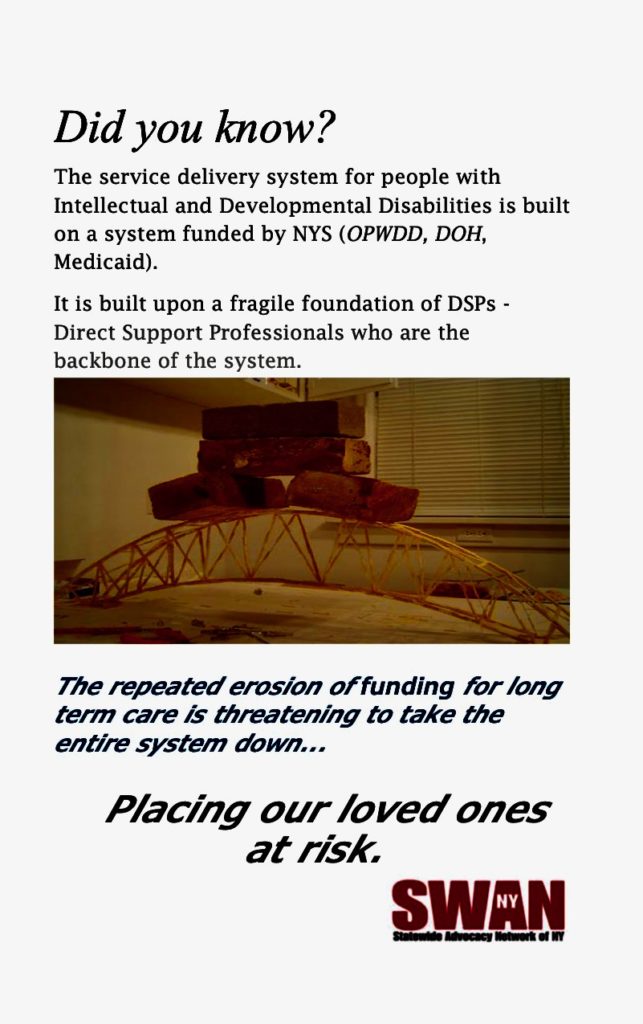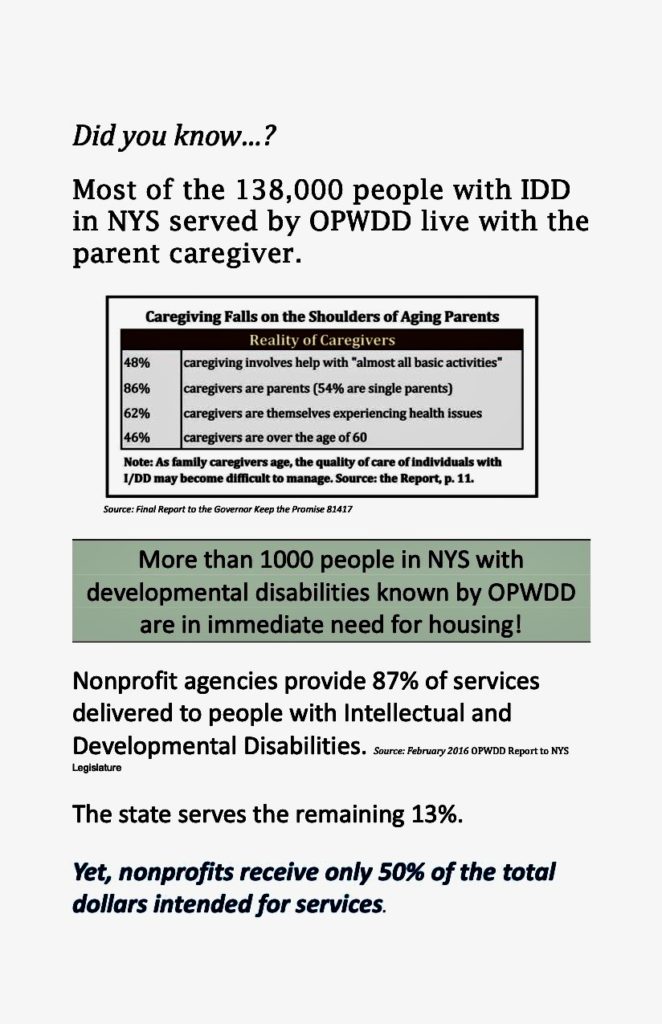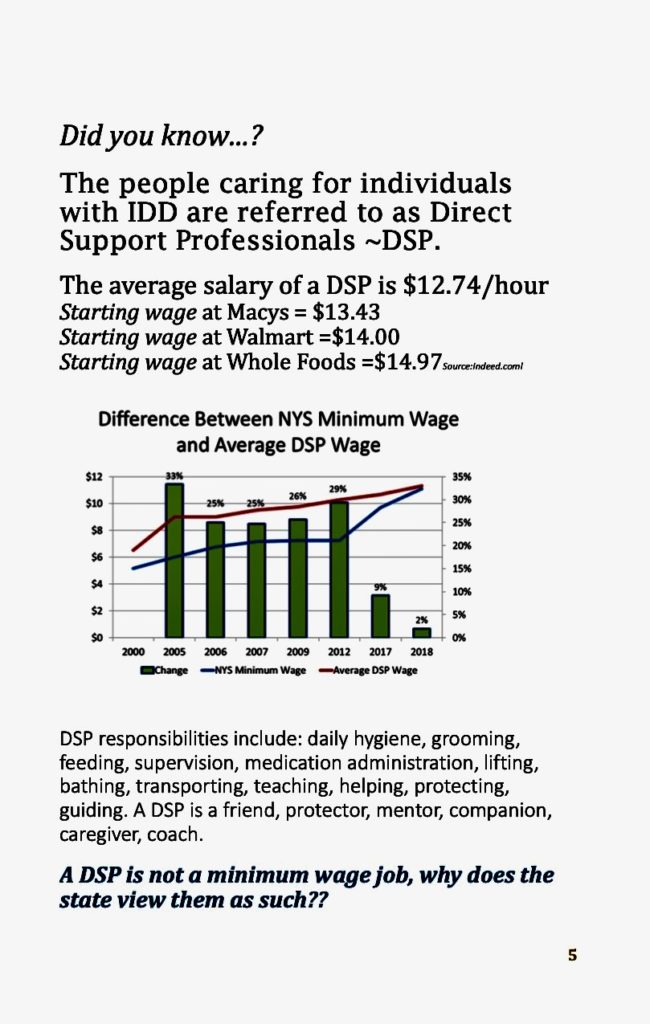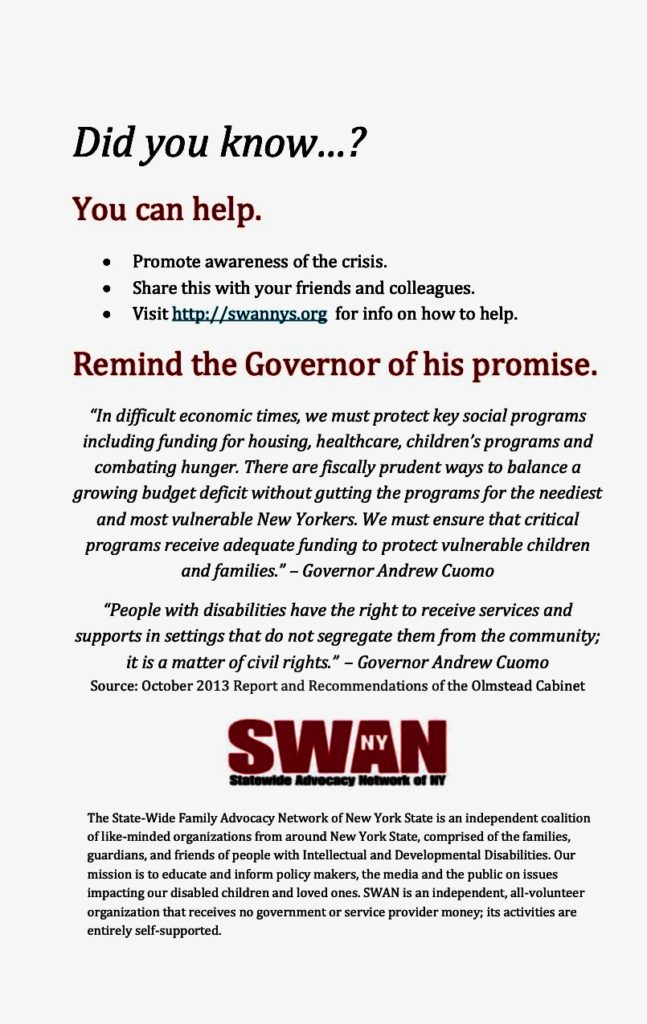



The State-Wide Family Advocacy Network of New York State is an independent coalition of like-minded organizations from around New York State, comprised of the families, guardians, and friends of people with Intellectual and Developmental Disabilities. Our mission is to educate and inform policy makers, the media and the public on issues impacting our disabled children and loved ones. SWAN is an
independent, all-volunteer organization
that receives no government or service provider money; its activities are
entirely self-supported.
[1] Official Journal of the American Academy of Pediatrics; Prevalence and Trends of Developmental Disabilities among Children in the United States: 2009-2017, October 2019; 144 (4) e20190811.
[2] Pg. 17, NASDDDS, Human Services Research Institute; National Core Indicators 2017 Staff Stability Survey Report. Jan 2019
[3] Pg 16, Center for Consumer Engagement in Health and Innovation; Service Disrupted: Managed Long Term Services and Supports Falling Short for Adults with Intellectual and Developmental Disabilities. November 2019
[4] Pg. 5, Health Management Associates; Current Landscape; Managed Long-Term Services and Supports for People with Intellectual and Developmental Disabilities, prepared for ANCOR. June 11 2018
[5] Medicaid and Chip Payment and Access Commission (MACPAC); Managed Care’s Effect on Outcomes
[6] Pg. 35, Intellectual and Developmental Disability Care Evaluation, University of Texas School of Public Health. December 31, 2018
[7] Pg 12, IDD LTSS Texas Health and Human Services Commission, Carve-In Cost-Effectiveness Evaluation Report. Deloitte, Jan11, 2019
[8] Pg 1, Health Management Associates; Current Landscape; Managed Long-Term Services and Supports for People with Intellectual and Developmental Disabilities, prepared for ANCOR. June 11 2018
[9] Pg 1, Health Management Associates; Current Landscape; Managed Long-Term Services and Supports for People with Intellectual and Developmental Disabilities, prepared for ANCOR. June 11 2018
[10] Pg 43, Health Management Associates; Current Landscape; Managed Long-Term Services and Supports for People with Intellectual and Developmental Disabilities, prepared for ANCOR. June 11 2018
SWAN-data-analysis-1-14-20-FINAL-VERSIONThe Office for People with Developmental Disabilities (OPWDD) is THE voice and advocate in state government for the very unique needs of individuals with intellectual and developmental disabilities (IDD). We seek additional funding, as well as administrative and legislative support to sustain critically needed supports and services, and to address unmet need. Following years of imposed budget neutrality even as need has grown; it has become imperative that OPWDD’s budget be increased. Only this can ensure that essential services for our most vulnerable citizens are safeguarded despite the self-imposed Medicaid budget cap.
Sadly, the workforce crisis continues, as a result of both chronic inadequate state funding of nonprofit services for individuals with IDD and the raise in the minimum wage. There are still alarmingly high vacancy rates, staff turnover and work force gaps creating instability for our loved ones. This shortage contributes to gaps in oversight, lack of care continuity and increased training needs, all of which create additional invisible costs, increased risk for individuals and potential liability for the state. Efforts to finance, build and retain a strong workforce in the nonprofit sector for individuals with IDD are essential in sustaining New York’s service delivery system for our most vulnerable citizens.
Individuals with complex physical and/or behavioral needs require a significantly higher level of supports and services. Current rate rationalization models have made it increasingly impossible for these individuals to access appropriate services due to the increased cost and specialty of care they require. We seek either additional/ongoing funding to ensure appropriate, sustainable service delivery for our most complex individuals or “needs based” funding mechanisms to provide incentive and ensure sustainability of service delivery for all levels of complexity.
A new system of Care Management was introduced on July 1, 2018. This shifted Medicaid Service Coordination to seven new Care Coordination Organizations (CCO) that oversee Care Managers. They are a critically important component of access to and delivery of services. Unfortunately, this well intended consolidation has fallen far short of expectations. For many, the enhanced care management promised has been little more than an endless process of questionable assessments while many families have seen a revolving door of care managers. Accurate evaluation and assessment of need, as well as meaningful quality measures must be fully and effectively operational; technology across all systems needs to be aligned and integrated so as to provide for consistent, data driven enabling and quality control. Without this resolution, moving on to Managed Care is not advisable.
SWAN-legislative-messaging-1-14-20-FINAL-VERSION-2